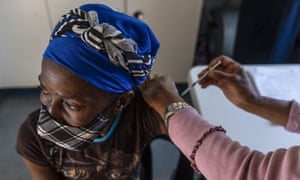
8.04pm EST20:04
Omicron becomes dominant variant in South Africa
The heavily mutated Omicron variant has propelled a sharp rise in Covid cases in South Africa as health experts describe the degree of increase as “worrying”.
The variant now accounts for 74% of all the virus genomes sequenced in the nation last month after it was first found in a sample taken on 8 November in Gauteng, South Africa’s most populous province.
Covid cases have risen from a weekly average of around 300 new cases per day to 1,000 last week and most recently to 3,500. A total of 8,561 new cases were reported on Wednesday alone – double the number of new cases recorded the day before, according to data from the National Institute for Communicable Diseases (NICD).
Dr Michelle Groome, head of the NICD, said the increase was “exponential” adding that the “rapidly increasing number of new daily cases” was “fuelled by the variant” known as Omicron, Agence France-Presse reports.
South Africa’s National Institute for Communicable Diseases (NICD) said early epidemiological data suggested Omicron was able to evade some immunity, but existing vaccines should still protect against severe disease and death.
World Health Organization (WHO) epidemiologist Maria van Kerkhove told a briefing that data on how contagious Omicron was should be available “within days.”

A woman is vaccinated against Covid-19 at the Lenasia South Hospital, near Johannesburg on 1 December as South Africa records a surge in cases. Photograph: Shiraaz Mohamed/AP
Updated
at 8.09pm EST
7.49pm EST19:49
Hello everyone, it’s Samantha Lock here, ready to take you through all the Covid news this Thursday.
It’s been a very busy few days on the Covid front as countries swiftly respond to the emergence of the Omicron variant.
Let’s start with the news that the Omicron variant has propelled a sharp rise in Covid cases in South Africa as health experts describe the degree of increase as “worrying”.
Covid cases have risen from a weekly average of around 300 new cases per day to 1,000 last week and most recently to 3,500. A total of 8,561 new cases were reported on Wednesday alone, according to data from the National Institute for Communicable Diseases (NICD).
Dr Michelle Groome, head of the NICD, said the increase was “exponential” adding that the “rapidly increasing number of new daily cases” was “fuelled by the variant” known as Omicron.
Here’s a quick rundown of everything you might have missed over the past 24 hours.
- The US reported its first Omicron case identified in California and discovered in a traveller who returned from South Africa on 22 November and tested positive on 29 November.
- The World Health Organization has urged countries to prioritise getting the unvaccinated vaccinated, both nationally and globally, rather than boosters.
- Ministers in the UK have secured new contracts to buy 114m more Covid-19 vaccines for the next two years.
- The US will extend requirements for travellers to wear masks on aeroplanes, trains and buses and at airports and train stations through mid-March.
- Greek lawmakers approved legislation making vaccination for Covid mandatory for all residents aged over 60. Some 17% of Greeks aged over 60 have not yet been vaccinated. They have until 16 January to get their first jabs, or will be fined 100 euros for every month they remain unvaccinated.
- The United Arab Emirates announced its first known case of the new Covid variant Omicron.
- Moderna could have a Covid booster shot targeting the Omicron variant tested and ready to file for US authorisation as soon as March, the company’s president said.
- The EU must consider mandatory vaccination, European Commission president Ursula von der Leyen said. One-third of Europe’s 150-million population are not vaccinated.
- The UN condemned the travel bans implemented in response to Omicron as “unfair, punitive and ineffective”.


